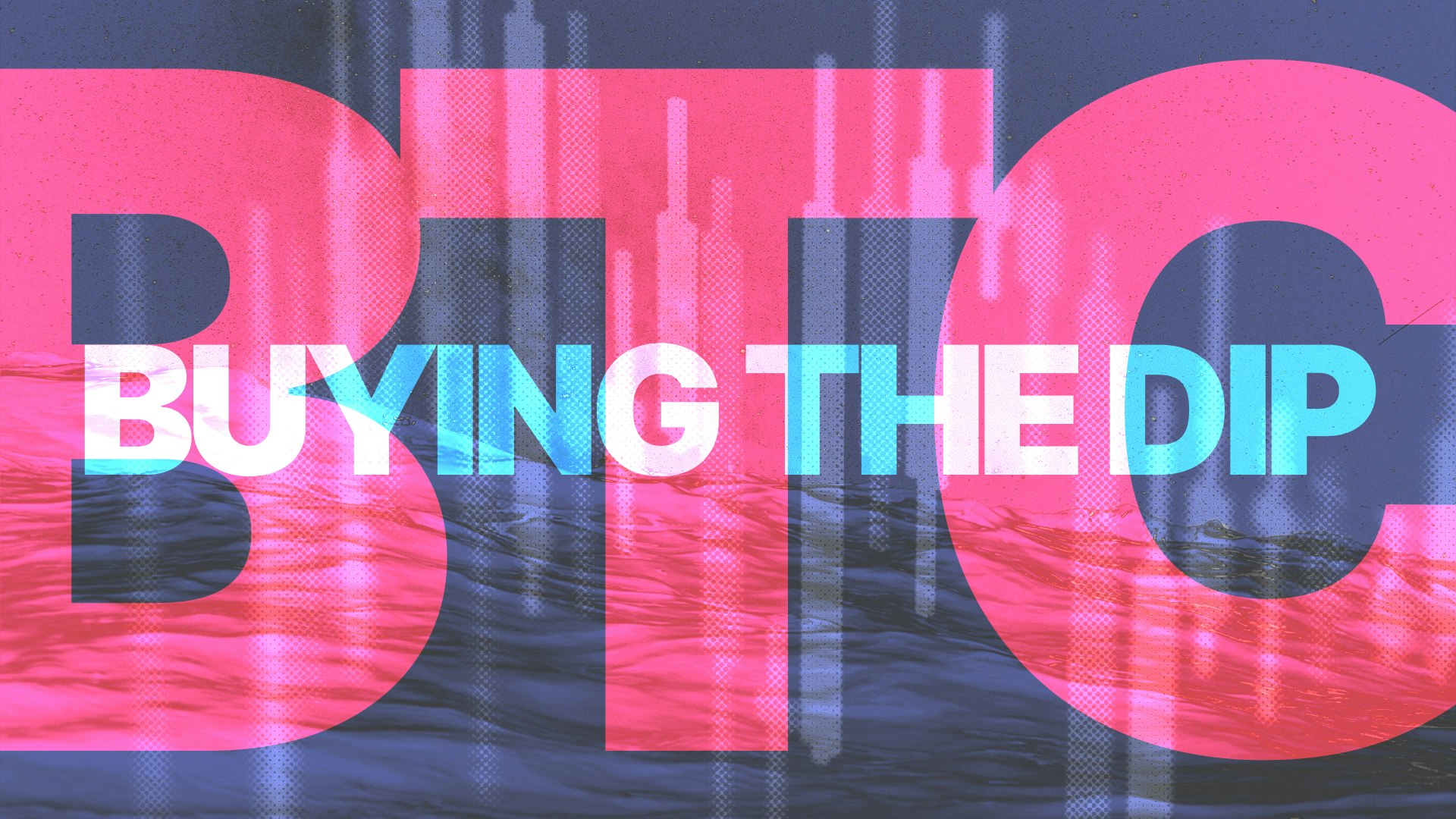Buying the Dip: When is the Right Time to Buy Bitcoin?
When should you buy Bitcoin? What does it mean to "buy the dip"? How does this investment strategy work?
In this article...
- "Dip" refers to a temporary decline in the price of an asset, such as Bitcoin
- Some investors use this as a time to accumulate a crypto
- Timing matters.

What does it mean to “buy the dip”? Does it involve guacamole before a party? No, in crypto, it is a well-known strategy. If you are thinking about when to buy Bitcoin or other crypto, then read on.
When it comes to navigating the volatile waters of cryptocurrency markets, the phrase “buy the dip” has become a familiar refrain. But what does it really mean, especially in the context of Bitcoin?
Let’s talk about the intricacies of this strategy, explore its potential benefits, and provide practical tips for implementing it effectively.
Understanding the Dip
Before we dive in, let’s clarify what we mean by “the dip.” In simple terms, it refers to a temporary decline in the price of an asset, such as Bitcoin. When the market experiences a dip, some investors see it as an opportunity to buy at a lower price, anticipating that the asset will eventually rebound.
This doesn’t necessarily mean the price will rebound, it may crash into the bottom of the sea and never rise again. But with a crypto like Bitcoin, the price has, since its inception, worked in cycles, so it makes sense that it will continue to do that in the future.
The Buy-the-Dip Strategy
Here’s how most people use the “buy the dip” strategy.
Set guidelines
When considering the buy-the-dip approach, establish guidelines for yourself. How much of a dip are you willing to buy? Having a predefined threshold helps you avoid impulsive decisions driven by market fluctuations.
Market timing vs. long-term investment
It’s essential to recognise that buying the dip is not a long-term investment strategy. Instead, it’s a form of market timing. While it can be profitable when executed correctly, it’s crucial to differentiate between short-term tactical moves and a well-thought-out investment plan.
Trending markets
The buy-the-dip strategy works best in markets that trend upward over time. When an asset like Bitcoin is on an overall growth trajectory, buying during dips can lead to favourable returns. However, in falling markets, alternative strategies will be needed.
Avoiding peaks
Timing matters. Avoid buying a coin when its price is at its peak. Instead, consider accumulating more during dips. Whether you’re a seasoned trader or a novice investor, this principle remains relevant.
Bitcoin and the Dip
Bitcoin, as the flagship cryptocurrency, has experienced its fair share of dips and surges. Let’s look at the history.
Historical volatility
Bitcoin’s price history is marked by extreme volatility. Significant price swings are common, making it an ideal candidate for the buy-the-dip strategy.
Risk management
Assess your risk tolerance. While buying the dip can be lucrative, it also involves risk. Diversify your portfolio and allocate only what you can afford to lose.
Research and analysis
Stay informed. Understand the factors influencing Bitcoin’s price movements. Technical analysis, fundamental news, and market sentiment all play a role.
Conclusion: Should you buy the dip?
In the crypto world, buying the dip is both an art and a science. It requires discipline, research, and a keen eye for opportunities.
Remember that not all dips are created equal, and good decision-making is essential. Whether you’re a seasoned HoDLer or a curious newcomer, consider the dip as a strategic tool in your crypto arsenal.
So, the next time Bitcoin takes a dip, ask yourself: Is this an opportunity or a trap? With the right approach, it could be your ticket to potential gains in the ever-evolving crypto landscape.

Frequently asked questions
What is the “buy the dip” strategy?
The “buy the dip” strategy refers to purchasing an asset, such as Bitcoin (BTC), when its price experiences a temporary decline. The goal is to capitalise on lower prices, anticipating that the asset will eventually rebound.
Why should I consider buying the dip?
Longer-term perspective
Buying the dip aligns with a longer-term investment approach. It assumes that market fluctuations are temporary, and assets will recover over time.
Dollar-cost Averaging (DCA)
By consistently buying during dips, you can achieve an average cost over time, reducing the impact of short-term volatility.
Risk management
Managing risk involves strategic buying during price declines, rather than panic-selling.
How do I implement the buy-the-dip strategy?
Set rules
Define specific criteria for buying the dip. For example, consider purchasing when Bitcoin drops by a certain percentage within a week.
Avoid timing the market
Instead of trying to time the exact bottom, focus on accumulating during dips over time.
Peer-to-Peer transactions
Explore peer-to-peer platforms to buy Bitcoin directly from other users.
What is the role of market capitalization?
Market capitalization (market cap) is the total value of a cryptocurrency. Understanding market cap helps you assess an asset’s size and potential for growth.
How does dollar cost averaging work?
Dollar cost averaging involves investing a fixed amount at regular intervals (e.g., monthly). This strategy reduces the impact of price volatility and allows you to accumulate assets over time.
Who is Satoshi Nakamoto?
Satoshi Nakamoto is the pseudonymous creator of Bitcoin. Understanding Bitcoin’s origins and Nakamoto’s vision can provide valuable context for your investment decisions.
What Is a stop loss order?
A stop loss order is a way to manage risk. It automatically sells an asset when its price reaches a predetermined level, limiting potential losses.
How can I assess Bitcoin’s price declines?
-Monitor technical indicators.
-Analyse historical price patterns.
-Stay informed about market news and events.
Is buying Bitcoin Peer-to-Peer safe?
While peer-to-peer transactions offer privacy and direct ownership, exercise caution. Use reputable platforms and verify the counterparty’s credibility.
When Is the right time to buy Bitcoin?
The right time to buy Bitcoin depends on your investment goals. Consider both short-term opportunities (dips) and longer-term trends.
Remember, successful dip-buying requires a balanced approach, research, and risk management. Understanding these terms and strategies will empower you in the dynamic world of cryptocurrencies.
What Is averaging down?
Averaging down is a value-oriented investing strategy. It involves buying additional shares of a stock or cryptocurrency when its stock price drops.
By doing so, you lower the average price at which you purchased the asset.
For instance, say Fred buys an asset like Bitcoin. Fred initially bought 100 Bitcoin at $20 per BTC and it later dropped to $10. So purchasing another 100 BTC would result in an average price of $15 per BTC.
However, remember that averaging down doesn’t magically decrease your overall loss; it merely adjusts your average cost.

Suggested Articles

Bitcoin Dominance: Is Alt Season Near? Technical Analysis May Provide Clues
What is Bitcoin Dominance? And how can keeping an eye on it give insight into alt season? Here is the explainer.Read more
Why Should You Buy Bitcoin? Top 10 Reasons To Consider
Why should you buy Bitcoin? Here are some compelling reasons why the crypto bros and the crypto sisters think BTC is a great investment.Read more
Why Buying Bitcoin Is a Smart Hedge Against Inflation
Should you buy Bitcoin as a hedge against inflation? What even is a hedge against inflation? Let's find out.Read moreBrowse by topic
The above article is not to be read as investment, legal or tax advice and takes no account of particular personal or market circumstances; all readers should seek independent investment, legal and tax advice before investing in cryptocurrencies.
This article is provided for general information and educational purposes only. No responsibility or liability is accepted for any errors of fact or omission expressed therein. CoinJar, Inc. makes no representation or warranty of any kind, express or implied, regarding the accuracy, validity, reliability, availability, or completeness of any such information.
Past performance is not a reliable indicator of future results.
Your information is handled in accordance with CoinJar’s Privacy Policy.
Copyright © 2025 CoinJar, Inc. All rights reserved.
CoinJar, Inc. is a registered Money Services Business with FinCEN and licensed as a money transmitter, NMLS #2492913. For a list of states in which CoinJar, Inc. is licensed or authorized to operate, please visit here. In certain other states, money transmission services are provided by Cross River Bank, Member FDIC.
This site is protected by reCAPTCHA and the Google Privacy Policy and Terms of Service apply.

